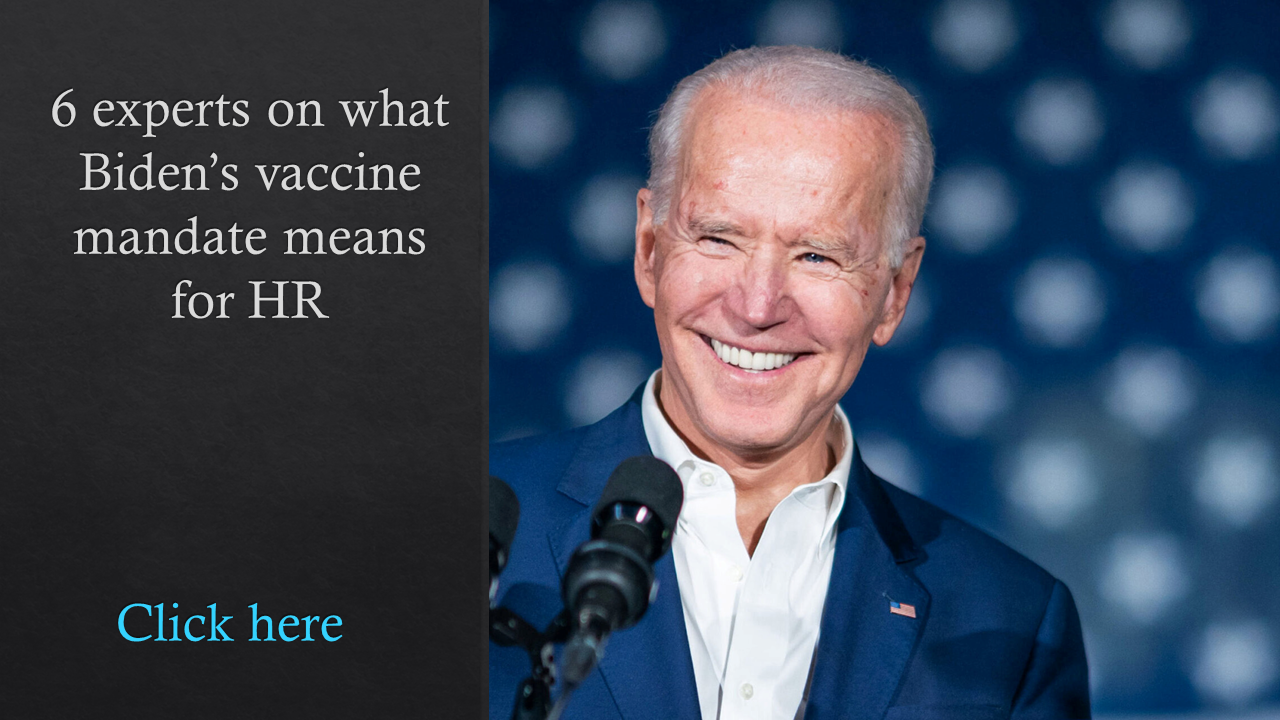COVID-19 vaccination has become one of employers’ biggest responsibilities—and pain points. There’s been debate over what role companies should take: if they should encourage the shots for their employees, require them or simply do nothing. Companies have grappled with vaccination requirements as they look to reopen their workplaces. They’ve have had to figure out how to track and verify who among their workforce has been vaccinated. And millions of employers will soon be subject to the upcoming federal requirement that they mandate workers get vaccinated or undergo weekly COVID testing.
Now, company leaders have to add another variable to the vaccination equation: additional COVID-19 shots for vaccinated individuals.
Seniors and immunocompromised patients were already eligible, and advised, to receive third doses of Pfizer and Moderna shots. Now, adults who received the single dose of the Johnson & Johnson vaccine are being advised to receive booster shots. Early Friday, the Food and Drug Administration authorized boosters for everyone 18 and older who received second shots of Pfizer or Moderna vaccines at least six months ago, and the Centers for Disease Control and Prevention is expected to agree later today, meaning all adults could be eligible by the weekend.
So, what does this mean for employers, and what should they do?
The primary priority, experts say, is communication.
“Employers still have a definite role on this messaging,” says Mary Kay O’Neill, senior health and benefits consultant at Mercer.
Mary Kay O’Neill, Mercer
As many company and HR leaders have done with vaccination so far, they should continue messaging on the benefits of getting a booster or additional shot if employees are eligible. General messaging should be targeted at the entire employee population, as employers do not, and should not, know health statuses of employees. “It’s almost a public service message,” O’Neill says. “It’s best to tell them to reach out to their healthcare provider about their specific health conditions or eligibility.”
Employers would be wise to act as credible messengers to reiterate the safety and efficacy of COVID-19 vaccines, as well as emphasize that the shots are free to receive, O’Neill says. Equally important is that they offer additional paid time off for employees to receive a vaccine, then recover from any side effects of a booster shot. As with the primary COVID vaccination, it’s important to make getting a vaccine as easy as possible and remove any barriers, experts say.
Though COVID booster shots are becoming a big conversation point, employers should keep their focus on the most important task: getting employees their first COVID vaccines, says Dr. Jeff Levin-Scherz, population health leader at Willis Towers Watson.

Jeff Levin-Scherz, MD, MBA
“At the moment, employers should be keeping their eyes on the prize, and that focus still has to be getting people to have their primary vaccination,” he says. Although talk about additional COVID-19 shots has become more widespread, nearly half of Americans are still unvaccinated against COVID-19—a highly problematic statistic when it comes to ending the pandemic. Plus, unvaccinated employees can cause big problems for employers, including increased disability claims, high medical costs, employee absences and high rates of infection in workplaces.
Related: Want to get workers vaccinated? Try these 6 strategies
“Anyone who is recommended to get boosters should absolutely get them, but boosters right now are recommended for a minority of most workforces,” Levin-Scherz notes, adding that it’s essential to let employees know that primary vaccinations are “still very, very effective” in fighting COVID-19. “We need to get more people vaccinated.”
Making sure employees get their primary vaccines also protects the most vulnerable employees who would require booster or third doses, like immunocompromised individuals or older workers, Levin-Scherz says.
In recent months, employers have been beefing up their efforts to boost vaccination rates in advance of Biden’s upcoming employer vaccine mandate, with many turning to mandates of their own. It’s been a slow start, but experts are hopeful the tide will soon begin to turn. “I am optimistic that we will continue to increase the number of people who are getting their primary vaccines,” Levin-Scherz says.
See also: Is your talent really walking out the door to avoid a COVID vaccine?
Because recommendations and guidance on additional COVID shots are still evolving, there are a variety of things employers should continue to watch. For instance, will the definition of “fully vaccinated” shift to include third doses for the Moderna or Pfizer vaccines or second doses for those who received a Johnson & Johnson vaccine? If so, that could have big implications for employers in light of upcoming workplace employer mandates.
“It’s something to watch. At which time the CDC or whoever decides that ‘fully vaccinated’ means that you’ve had your booster shot is anyone’s guess,” O’Neill says. “I think it’s just a more encouragement and messages right now.”
Originally published Nov. 2, this story was updated Nov. 19 to reflect the FDA’s authorization of booster shots for anyone 18 and older who received the Pfizer or Moderna vaccines.